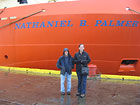

 | |||||||||||||||||||
|
|
Journals 2007/2008Mark Goldner
November 7, 2007 I arrived this afternoon in Punta Arenas, Chile along with 7 US scientists from the University of Rhode Island and the Scripps Oceanography Institute in San Diego. I'm now in the Southern Hemisphere for the first time in my life. We flew from Boston to Miami, then to Santiago (the capital of Chile), and then down to Punta Arenas. Flying from Santiago to Punta Arenas I had a stunning view of the snow-capped Andes Mountains.
Although it's springtime down here, today it feels like a typical Boston November. It's been raining all afternoon (quite heavy at times) and we even got a little snow. It‚s also quite windy here, and with the temperature only around 40 it's really raw. I better get used to this - this is nothing compared to some of the weather we can expect once we're at sea! We had a chance to see the ship we'll be on, the R/V Nathaniel B. Palmer. The scientists are trying to figure out how to stow all the many pieces of equipment, sensors, etc. that we'll be deploying on the trip.
The purpose of this research mission is to investigate many characteristics of the water in the Drake Passage, to better understand how the Antarctic Circumpolar Current works. Ultimately this may be useful in understanding the effects of global warming. In order to do this study, a variety of very large instruments need to be deployed overboard. As I get more familiar with these instruments, I'll write more about them. Right now we're scheduled to leave port next Tuesday, there are some repairs being made to the ship's computer systems, but if we have some luck we may get to push off earlier. In the meantime we'll be loading up the ship and getting outfitted with some serious Antarctic weather gear. |
||||||||||||||||||



